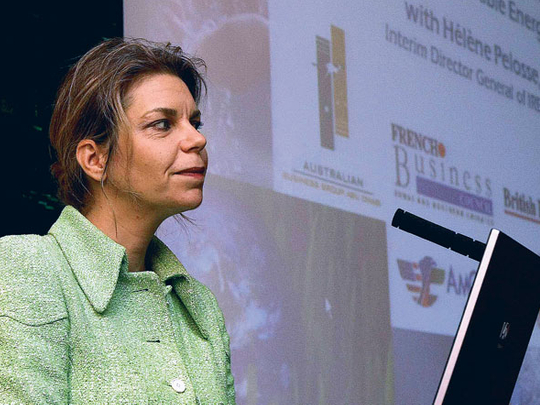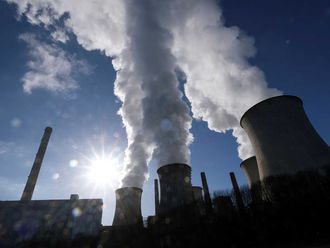
Abu Dhabi: Spend one per cent of gross domestic product (GDP) now on renewable-energy sources or loose 20 per cent of the GDP later are the two options before the world, according to a senior official of Irena, the International Renewable Energy Agency.
"Business as usual — producing and consuming the energy as usual — will not work any more; we have to transform the energy sector within the first half of this century, within two generations [to meet energy demand without destructing environment]," said Hélène Pelosse, Interim Director General of Irena. She was speaking at a meeting in the capital yesterday, organised by the French Business Group (FGB) Abu Dhabi in partnership with six other business groups.
Jean-Pierre Giraud, the president of the FGB, made the introductory speech at the meeting.
"If we act now, it will cost one per cent of GDP, but delayed action will cost us 20 per cent of GDP. And the scale of the damage will be greater than the impact of world wars; we just cannot afford it [to not tackle climate change]," Pelosse explained.
Climate change is a global issue and it has to be addressed globally, she said.
Alternative sources
She reiterated that the sun could provide 2,000 times the current global energy demand and the wind 200 times.
She said it is important how we produce electricity for 9 billion people in 2050. The UAE being one of the major oil-producing countries and an Irena host sends out a strong message to the world that "we cannot rely on the energy of the past for the future," she said.
The UAE is aiming to produce seven per cent of its energy from renewable sources by 2020 and Masdar City, the zero-carbon city in Abu Dhabi, will cost 10 per cent of GDP, she noted.
All the Gulf countries are moving towards setting targets for renewable energy sources, including Kuwait and Bahrain, Pelosse said.
Investments are stable
The global economic downturn has not discouraged investments in the renewable-energy sector, according to Hélène Pelosse, Interim Director General of Irena.
"Renewable energy is catching up ... in 2009, more capacity was added to the renewable-energy sector, compared to the addition in conventional-energy capacity," she said.
"In 2009, the wind capacity was increased by 31 per cent worldwide, despite the financial crisis," she said at a meeting. China became third after the US and Germany in the wind-energy sector, she noted.
Between 2004 and 2008, 75 per cent of renewable capacity was added, she said.
End fossil-fuel subsidies
Governments should stop the $400-billion (Dh1.5 trillion) annual fossil-fuel subsidy and instead subsidise renewable-energy technologies, said Pelosse.
Speaking to Gulf News on the sidelines of the meeting, she said fossil-fuel subsidies witnessed a downward trend after the commitment from G8 countries.
Asked for a good example of renewable-energy sources subsidy, she said Spain has been giving huge subsidies for wind energy which support the sector positively.












